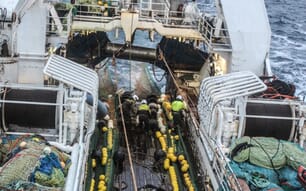The agreement is based on the objective of achieving maximum sustainable yields (MSYs) by 2017 where possible, and by 2020 at the latest, while taking into account specific and fully justified socio-economic circumstances.
The Council decision means the number of fish stocks managed at MSY levels will increase next year to 44 and the positive trend concerning stocks within safe biological limits will be strengthened. The agreement also tackles the question of choke species in mixed fisheries by providing elements of flexibility.
In the North Sea, quotas increasing include cod (+17 per cent), whiting (+17 per cent), saithe (+53 per cent), monkfish (+20 per cent), hake (+12 per cent) and prawns (+46 per cent).
North Sea haddock will go down by 46 per cent and herring (- 7 per cent).
"Sustainability has been the driver of today's agreement: the sustainability of our fish stocks, but also that of our fisheries sector. We have successfully reconciled different opinions to the benefit of all parties involved, and established the basis for the achievement of maximum sustainable yield," said Gabriela Mate?ná, Minister for agriculture and rural development of Slovakia and president of the Council.
EU Fisheries Commissioner Karmenu Vella added: "Today we have taken another important step towards sustainable fisheries, a core objective of the EU's Common Fisheries Policy. I am proud to say that our push for healthy fish stocks is starting to pay off: following years of disciplined fisheries policy, scientists this year advised increasing catch limits for several stocks in the Atlantic and North Sea. This is encouraging, and shows that sustainability really does get fishermen the best deal."
Commenting on the quotas, Bertie Armstrong, chief executive of the Scottish Fishermen’s Federation, said: “Although the outcome of the talks is good for the fishing fleet, we are concerned about the potential difficulties caused by more species coming into the discard ban regime."
"Fishermen hate discarding, but there is the worrying potential of mixed species fisheries closing down early because the catch allocation of one type of fish has been fully utilised. This is something that will have to be monitored very closely over the coming months.
“With Brexit now looming, fishermen can look to the future with real optimism as we are on the cusp of an exciting new era as a coastal state with full control of our 200-mile exclusive economic zone. This will give us the opportunity for fairer shares in catching opportunity and better fit-for-purpose sustainable fisheries management, which will benefit our coastal communities.”
Leslie Tait, chairman of Shetland Fishermen’s Association, also described the quota changes as broadly good news for local whitefish boats.
“The uplifts for cod, saithe, ling and monkfish are particularly welcome, especially with cod being subject to the discard ban from 1 January 2017,” he said.
“The major demersal stocks are in very good health – and that’s largely due to the efforts and sacrifices of fishermen stretching back a decade and more.
Whilst Scottish fishermen welcomed the quotas, ocean charity group Oceana stated that European fisheries ministers have not done enough to help fish stock recovery.
A press release from the organisation said: "Once again, ministers approved catch limits for 2017 that surpass scientific recommendations, ignoring the facts that 64 per cent of European stocks are overfished and 85 per cent are below healthy levels.
EU countries have a legally binding obligation to fish stocks at sustainable levels by 2020 at the latest. With today’s decision Ministers undermine their own Common Fisheries Policy."
“The consequences of today’s irrational decision will live longer than the Ministers’ political mandates. Half of Atlantic stocks are already overfished and overfishing will now continue into 2017.” explains Lasse Gustavsson, executive director of Oceana in Europe.
“It is difficult to understand why Ministers fail to see the great opportunity of fish recovery for EU fishermen and citizens alike. Rebuilding stocks will create more jobs in the fishing industry and provide more healthy food for European tables. Why is that not a political priority? By ignoring science in favour of short-term interests, Ministers are acting both economically and ecologically irresponsibly.”
ClientEarth scientist Liane Veitch added: “While some of the 2017 catch limits are based on EU fisheries laws and are based on sound science, many do not go far enough. Some quotas allow for serious overfishing.
“Ministers must be more ambitious to safeguard EU stocks and speed up benefits to the industry from healthier stocks. Otherwise, their short-term thinking will result in sharp shocks for fishermen and shoppers as the legal deadline for sustainable quotas is only three years away."




